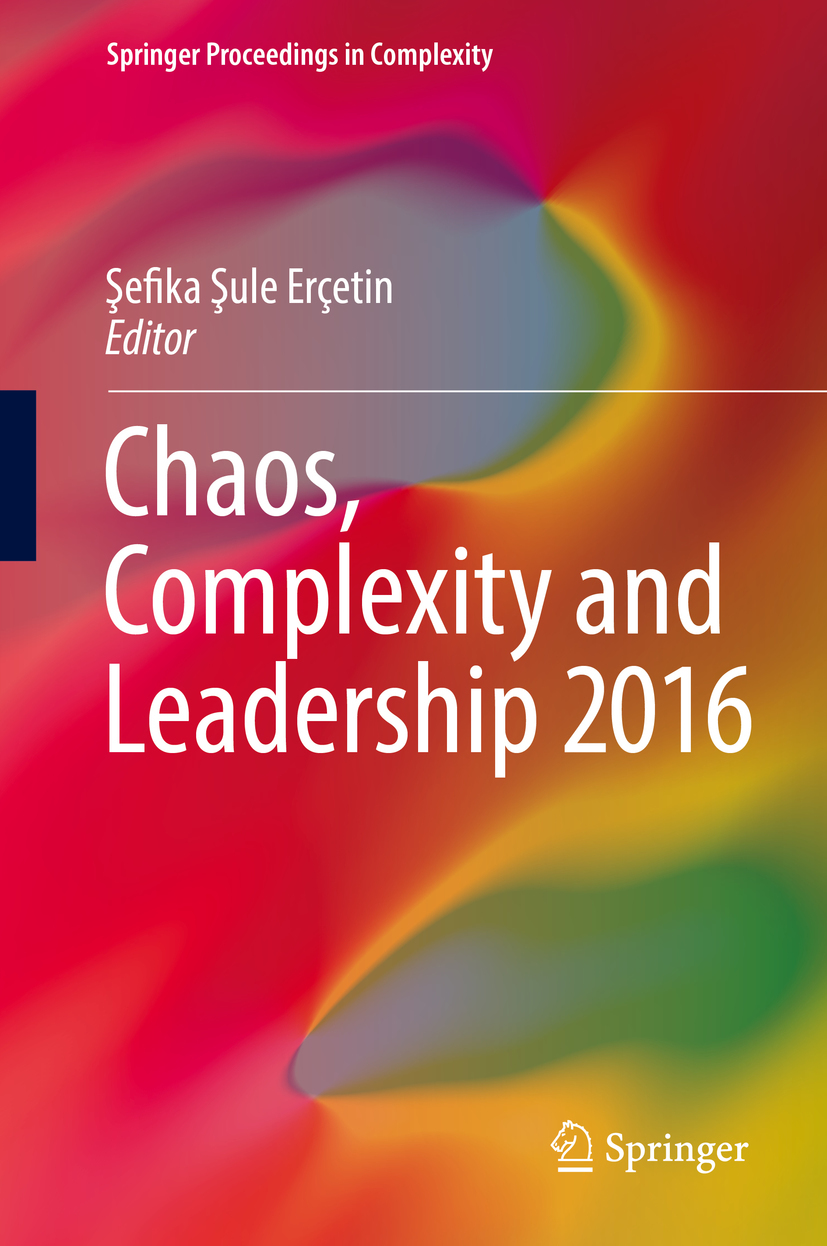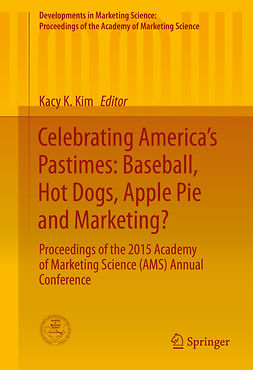Erçetin, Şefika Şule
Chaos, Complexity and Leadership 2016
1. Solutions to Chance-Constrained Programming Problems with Exponential Random Variables by Edgeworth Approximation
Mehmet Yılmaz, Nihan Potas
2. Erçetin and Açıkalın’s New Women Leadership Model: Development and Training
Şefika Şule Erçetin, Şuay Nilhan Açıkalın
3. The Influence of Leadership Awareness of Future Teachers on the Development of Their Managerial Competencies
Kadisha Kadyrovna Shalgynbayeva, Alimbekova Anar Aimoldanovna
4. Erçetin’s Plasma Leadership Model in the Context of Education and School Administration
Bilge Burçin Karaca, Ayşe Aygin Silsüpür, Nalan Sıdıka Alyamaç, Dilber Gizem Serter, Ernur Serter
5. Contemporary Educational Management Through the String Theory Lens
Şefika Şule Erçetin, Ssali Muhammadi Bisaso
6. Staff Experiences Regarding Student Engagement in Active Learning and Social Environments in New Generation Universities
Şuay Nilhan Açıkalın, Şefika Şule Erçetin
7. Deontological Training of Specialists as the Basis for the State Anti-corruption Strategy
Kertayeva Kaliyabanu, Meirkulova Aida
8. The Viability and Reliability of the Fractal Leadership Practices Scale
Şefika Şule Erçetin, Ssali Muhammadi Bisaso
9. Talent Management Practices A Trajectory and Ingenuity in Higher Education Institutions: A Meta-analysis Review of Literature
Farooq Miiro, Azam Otham
10. Student Engagement in Active Learning and Social Environments in New Generation Universities: Experiences of Students
Şefika Şule Erçetin, Şuay Nilhan Açıkalın
11. The Perceived Effect of Delegation on Employee Performance at Stanbic Bank Uganda Ltd., Mbale Branch
Rashid Kinsambwe, Zabia Kauma
12. The Utilization Level of Social Capital Approach in Tabriz Universities
Sabri Çelik, Nazila Ahmedimoayyed
13. A Paradigmatic Frame in the Definition of Leadership: “Transformational Leadership”
Aynur Saran
14. Role of Geospatial Mashups in the Development of Rural Tourism: A Study from West Bengal, India
Nilanjan Ray, Somnath Chaudhuri
15. Claim of Values in Dictionaries: An Example of the Anarchist Islands Model
A. Hıdır Eligüzel, Yağız Alp Tangün, K. Gediz Akdeniz
16. Understanding the New-Generation Universities: Learning, Teaching, and Managing
Şefika Şule Erçetin, Şuay Nilhan Açıkalın
17. Chaotic Method in the Process of Preparation to Transition to Higher Education and Undergraduate Placement Exams
Mehmet Özbaş
18. Sustainable Leadership Practices in Higher Education Institutions: An Analytical Review of Literature
Miiro Farooq
19. Chaos, Complexity, and Leadership in the Context of Organizational Uncertainty in Education and School Administration
Müzeyyen Petek Dinçman
20. Pre-pragmatic Perspectives of Leadership
Daniels Aide Okun
21. Profiles of New University Academic Staff: Changing Views of Turkish Postgraduate Students Between 2002 and 2016
Şefika Şule Erçetin, Şuay Nilhan Açıkalın, Feyza Gün
22. Reflection of Quantum Entanglement Principle to Organization Theory “Organizational Insight”
Şefika Şule Erçetin, Şuay Nilhan Açıkalın, Halime Güngör, Nihan Potas
23. Decision-Making Processes as Part of Administration in Chaotic and Non-chaotic Atmosphere in Educational Organizations
Pınar Temoçin
24. Examples Concerning Application of Chaos Theory in the Specialization Fields of Psychological Counseling and Guidance
Filiz Bilge, Ahmet Altınok
25. Levels of Using Social Capital in Schools According to School Principals and Teachers
Sabri Çelik, Mehmet Mert Namalır
26. The Significance of Metacognitive Learning Skills in Teacher Training and Their Relations to Chaos Management
Murat Özdemir, Ebru Gülcemal
27. A Source of Inspiration for Women: Christine Lagarde
Şaduman Kapusuzoğlu, Barış Eriçok
28. The Effects of Diverse Personality Characteristics of Teachers on Professional Satisfaction: A Sample of Mersin City
Lütfi Üredi, Hakan Ulum
29. Process of Technical Teacher Training in Turkey
Sait Akbaşlı, Pınar Mardin Yılmaz
30. Analysis of Scientific Papers on Organizational Uncertainty in Education and School Administration (1990–2016)
Müzeyyen Petek Dinçman, Didem Koşar
31. Social Justice Leadership in Education in the Axis of the Chaos Theory Does Social Justice Arise From Chaos? Social Justice Leadership with Chaos Approach in Educational Organizations
İlknur Şentürk, Gökhan Kılıçoğlu
32. Autonomy in Higher Education
Şefika Şule Erçetin, Leyla Yılmaz Fındık
33. Application of Information Technology in Improvement of Teachers’ Competence
R. K. Toleubekova, Galiya B. Sarzhanova
34. A Study on the Morpho-syntactic Profiles of Syrian Children Learning Turkish as a Second Language
Lütfi Üredi, Ömer Gökhan Ulum
35. The Perception of Administrators, Teachers, and Master Trainers Working for Public Education Centers Regarding Key Competencies of Lifelong Learning
Sait Akbaşlı, Mehmet Durnalı
36. Predicting Chronic Absenteeism Using Educational Data Mining Methods
Şebnem Özdemir, Fatma Çınar, C. Coşkun Küçüközmen, Kutlu Merih
37. Investigating the Educational Perspective of Atatürk, the Visionary Leader
Anıl Kadir Eranıl
38. Re-discussing School Management Processes in the Light of Complexity Theory
Nuray Kısa, Nedim Özdemir, Selçuk Turan
39. An Interdisciplinary Study: Quantum Leadership and Hybrid Leadership
Berrin Şenses, Pınar Temoçin
40. On the Possibility of Wise Leadership in Educational Management
Gülgün Çetin, Nazmiye Yıldırım, Hayati Özcan
41. Applicability of Glocal Leadership to Educational Institutions
Sonay Canbolat, Sibel Mumcu, Aycan Şahan, Fikriye Öcal, Nergiz Akdoğan
42. Multidimensional Perceptual Leadership Model: Implications for Education and School Leadership, Old Officials, New Officials and New Global Challenges
Meral Balta Uçan, Fatma Süheyla Ayaz, Merve Karagöz, Oya Çetin, Buse Özaksoy
43. Mobbing in Educational Organizations
Belgin Tura, Nursel Yardibi
44. Managerial Approaches Adopted by School Directors with Diverse Personality Characteristics: A Sample of Mersin City
Lütfi Üredi, Mustafa Özarslan, Hakan Ulum
45. The Application of the New War Thesis to the Conflicts of Xinjiang, Kashmir, and Assam and Nagaland
Abdulsalam Dallal
46. Complex Relationships of Symbiotic Organizations
Elif Gamze Özcan
47. In Chaotic Situations in Preschool Institutions, Do Leaders Reach Through the Game?
Behiye Ertaş
48. Analysis of Margaret Thatcher as a Woman Leader
Anıl Kadir Eranıl
49. Analysis of Dissertations Addressing Key Issues Like Leadership to Lifelong Learning in Education
Emel Terzioğlu Barış
50. Perception of Violence Against Women in the Construction of Patriarchy
Aylin Görgün-Baran, Birsen Şahin-Kütük, S. Dicle Maybek
51. An Assessment System for Monitoring the Academic Development of Students
Recep Gür
52. Views of Teachers on Relationships Between Emotional Intelligence Skills of School Principals and Organizational Commitment of Teachers
Gönül Şayır
53. First Grade to Fifth Grade: A Chaos Analysis
Belgin Tura
54. Fuzzy Logic-Based Operational Research Techniques in Educational Administration: A Content Analysis
Zeliha Yaykıran
Keywords: Business and Management, Operations Research/Decision Theory, Simulation and Modeling, Applications of Nonlinear Dynamics and Chaos Theory, Economic Theory/Quantitative Economics/Mathematical Methods
- Editor
- Erçetin, Şefika Şule
- Publisher
- Springer
- Publication year
- 2018
- Language
- en
- Edition
- 1
- Series
- Springer Proceedings in Complexity
- Page amount
- 13 pages
- Category
- Economy
- Format
- Ebook
- eISBN (PDF)
- 9783319645544
- Printed ISBN
- 978-3-319-64552-0











